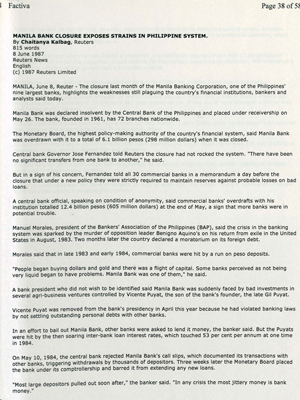MANILA BANK CLOSURE EXPOSES STRAINS IN PHILIPPINE SYSTEM
[Reuters]
Published date: 8th Jun1987
8 July 1987
Reutera News
English
(c) 1987 Reuters Limited
MANILA, June 8, Reuter – The closure last month of the Manila Banking Corporation, one of the Philippines‘ nine largest banks, highlights the weaknesses still plaguing the country’s financial institutions, bankers and analysts said today.
Manila Bank was declared insolvent by the Central Bank of the Philippines and placed under receivership on May 26. The bank, founded in 1961, has 72 branches nationwide.
The Monetary Board, the highest policy-making authority of the country’s financial system, said Manila Bank was overdrawn with it to a total of 6.1 billion pesos (298 million dollars) when it was closed.
Central bank Governor Jose Fernandez told Reuters the closure had not rocked the system. “There have been no significant transfers from one bank to another,” he said.
But in a sign of his concern, Fernandez told all 30 commercial banks in a memorandum a day before the closure that under a new policy they were strictly required to maintain reserves against probable losses on bad loans.
A central bank official, speaking on condition of anonymity, said commercial banks‘ overdrafts with his institution totalled 12.4 billion pesos (605 million dollars) at the end of May, a sign that more banks were in potential trouble.
Manuel Morales, president of the Bankers’ Association of the Philippines (BAP), said the crisis in the banking system was sparked by the murder of opposition leader Benigno Aquino’s on his return from exile in the United States in August, 1983. Two months later the country declared a moratorium on its foreign debt.
Morales said that in late 1983 and early 1984, commercial banks were hit by a run on peso deposits.
“People began buying dollars and gold and there was a flight of capital. Some banks perceived as not being very liquid began to have problems. Manila Bank was one of them,” he said.
A bank president who did not wish to be identified said Manila Bank was suddenly faced by bad investments in several agri-business ventures controlled by Vicente Puyat, the son of the bank’s founder, the late Gil Puyat.
Vicente Puyat was removed from the bank’s presidency in April this year because he had violated banking laws by not settling outstanding personal debts with other banks.
In an effort to bail out Manila Bank, other banks were asked to lend it money, the banker said. But the Puyats were hit by the then soaring inter-bank loan interest rates, which touched 53 per cent per annum at one time in 1984.
on May 10, 1984, the central bank rejected Manila Bank’s all slips, which documented Its transactions with other banks triggering withdrawals by thousands of depositors. Three weeks later the Monetary Board placed the bank under its comptrollership and barred it from extending any new loans.
“Most large depositors pulled out soon after,” the banker said. “In any crisis the most jittery money is bank money.“
“Family-controlled banks have long ago gone out of fashion,” another senior banker said. He said the central bank “should have thrown the book” at Manila Bank much earlier.
He said the bank may have been spared harsher action because in 1984 then president Ferdinand Marcos’ son in-law Gregorio Araneta joined its board as vice-chairman.
“Perhaps marcos put pressure on the central bank to defer acting,” the banker said.
Towards the end of Marcos’ rule, however, Vicente Puyat drew close to Benigno Aquino’s widow, Corazon. Some bankers said Puyat even helped finance Aquino’s campaign in last year’s presidential elections, which eventually led to Marcos‘ flight into exile.
But earlier this year when he was denied a senatorial nomination by Aquino for the May 11 congressional elections, Puyat joined the opposition Grand Alliance for Democracy, becoming its chairman, and unleashed a barrage of criticism of the government’s economic policies.
Despite his efforts, and his father’s reputation as a critic of Marcos, Vicente Puyat lost in the polls.
The senior banker said political expediency seems to have played a major role in Manila Bank’s closure just two weeks alter the elections. “If the bank had been closed earlier, Puyat would have emerged a martyr and won handsomely,” he said.
Morales said that around the time Manila Bank ran into trouble in early 1984, other banks were hit by reduced loan demand and a worldwide slump in commodity prices.
He said commercial banks cast around for new dollar sources and began financing smaller and non-traditional exporters of fish, prawns, handicrafts and garments.
Morales said the BAP presented its own suggestions for a reform of the banking system, calling for greater strictness in implementing controls.
“All of us suffered losses. We have undergone an orgy of write-offs,” he added. “But the banks that emerged from the crisis emerged stronger than before.”






